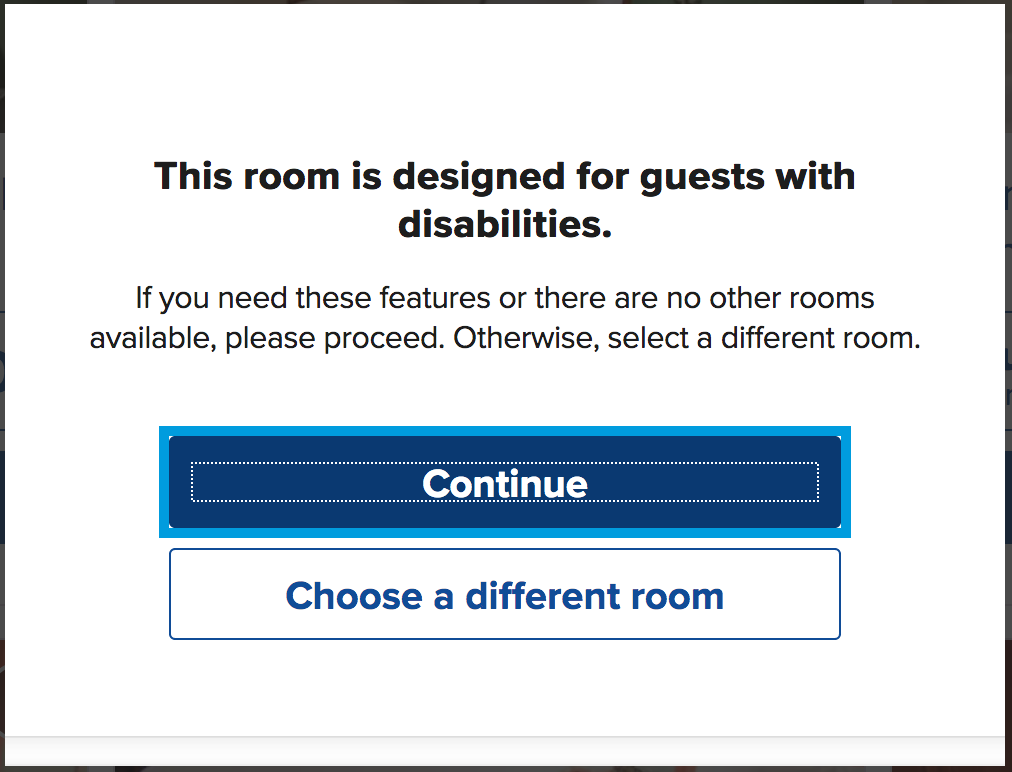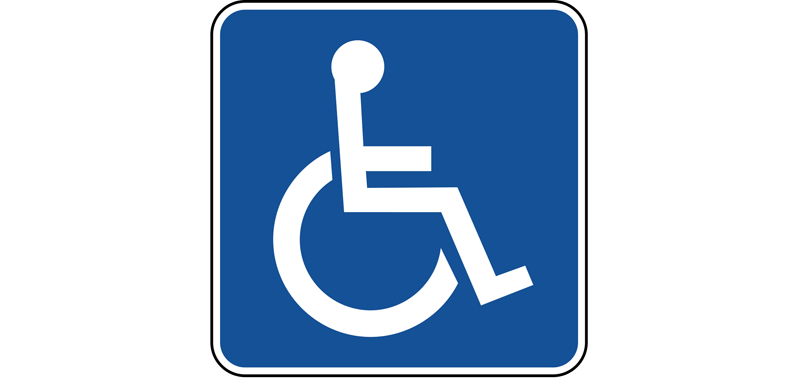Imagine if you were reserving a room for yourself at a hotel via its Internet web site, when you find that you can reserve a room specifically designated for disabled persons at a less-expensive rate — perhaps potentially saving you greater than $100.00 per night.”
In this article from Wednesday, August 30, 2006 — greater than 13 years ago — I asked, “Would you do it?” This topic was then revisited in this article on Saturday, June 18, 2016.
Rooms for Disabled Persons Revisited: Would You Reserve One if the Price was Right?
I encountered an actual example recently regarding the Hampton Inn Charleston-Downtown hotel property in West Virginia for the night of Wednesday, December 25, 2019.

I was given a choice of eight different room rates and types…

…and the first two rooms which are the least expensive are both for what is known as a Queen Mobility Access room with a room rate of $80.00 for the night — whereas the least expensive room rate for a room which was not specifically designed for people with mobility issues is $84.00 for the night.
When all taxes and fees are included, the final totals are $90.40 for the Queen Mobility Access room versus $94.92 for a room which was not specifically designed for people with mobility issues.
The total difference in price for the room rate is $4.52. Is reserving a room which is specifically designed for people with mobility issues really worth saving $4.52?
Just for fun, I decided to see what would happen if I attempted to go through with booking a reservation for the Queen Mobility Access room…

…and the following message appeared on the screen of my laptop computer before I could complete the reservation:
This room is designed for guests with disabilities.
If you need these features or there are no other rooms available, please proceed. Otherwise, select a different room.
Other rooms were obviously available at that hotel property for that specific night — but what if those Queen Mobility Access rooms are the only ones available? Consider following this advice which was given by FlyerTalk member writerguyfl: “As a former Revenue Manager, if it’s the only room left or the cheapest rate, I say book the accessible room. Simply add a note to the comments indicating that you don’t need it. There are always more accessible rooms than needed.”
FlyerTalk member darthbimmer does not want to ever be a guest in one of those rooms at all: “As an aside, I actually hate being assigned an accessible room. I always ask to be moved. One of the reasons is that some of the adjustments made in the name of ‘accessibility’ are actually unsafe. For example, ‘roll in’ showers are great for people confined to wheel chairs, but for anyone else– including those who can walk, but barely, and use a walker or cane– typically such showers have no barrier against water pouring all over the bathroom floor. The ensuing puddle is an enormous hazard. At least twice my mobility impaired wife has nearly slipped and fallen in a bathroom supposedly designed for her benefit.”
Those rooms are not always desired, as also demonstrated by FlyerTalk member IsleOfMan with this temporarily solution of sorts: “I have experienced the roll-in shower flood as described and on once occasion used a line of rolled-up towels as a barrier to channel water to the drain which was, inexplicably, in the middle of the bathroom itself instead of in the shower.”
Regardless, many FlyerTalk members do not mind reserving a room specially designed for guests who are disabled if the room rate is less expensive or if there is no other choice — as recounted by members of FlyerTalk such as Sisosig: “Had two stays with Marriott this month. In both cases was given an accessible room, without the front desk telling me. I felt extremely tired on both days, so I was happy to be able to just take a shower and jump into bed with the bonus of not running into any object.”
At least one other similar discussion was launched on FlyerTalk pertaining to this topic.
My Memorable Experience at One Hotel Property — At Which I Did Not Even Stay
I once dropped off a few relatives at a hotel property in the north county area of San Diego some years ago at which someone else booked reservations for them. The place looked like an absolute dump, and they were not exactly thrilled with staying at that hotel property; but it was too late to change their reservations. I drove a van specifically because all three of them had mobility issues: two of them were disabled and one of them was elderly. I parked it in the otherwise virtually empty parking lot across three parking spaces reserved for vehicles with placards so that they could easily get from the van to the exterior entrance of one of the rooms on the ground floor level — especially as one of them required the use of a wheelchair; and I had to help all of them in to get settled for the night.
Not 15 minutes later, I return to the van right outside of the room to find a ticket on the windshield issued by a law enforcement officer of San Diego County for greater than $400.00 because the van did not have a placard. After complaining to the poor kid in the small glass-enclosed space which served as the area to check in to this hotel property — complete with the requisite flickering fluorescent light — that law enforcement officer was called to return to the scene of the crime. He eventually negated the ticket — but not before admonishing me in front of the disabled and elderly relatives for not having the van equipped with the appropriate official placard.
I now laugh about that incident; but it was not funny at the time — although at least I did not have to be concerned about crime with a law enforcement officer lurking somewhere in that dark parking lot.
Summary
In the years in which I have been a frequent traveler, I have been assigned a room at a hotel designed for disabled people several times; and while there is more room in areas such as where a shower is taken in the bathroom, I am not particularly fond of those rooms — especially as they were designed for people who need them more than I do.
I do have to say that not once has management at a hotel property informed me that I needed to vacate the room because a guest who is disabled had just checked in at the last minute — and those few stays which I did experience were either one night or two nights at the most.
I refuse to use parking spaces reserved for people who are disabled — whether or not it is against the law. I only use public washrooms reserved for people who are disabled when the situation is absolutely necessary, which is quite rare — and even then, I keep one eye and ear open in case I need to vacate that facility as soon as possible.
One other thing: just because a person does not seem like he or she is disabled — when using a parking spot reserved for people who are disabled, for example — does not automatically mean that he or she is not disabled, according to this article posted at the official Internet web site of the Invisible Disabilities Association. Although judging that person may be easy to do, automatically jumping to conclusions may lead to an incorrect assumption — depending on the individual case, of course.
Is the act of an able-bodied person reserving a hotel room specially designed for a person who is disabled an ethical thing to do — especially when either no other rooms are available or the room rate is significantly lower than other rooms? Regardless of ethics, at what difference in the total cost of a room would you consider booking a reservation for a room designed for people with mobility issues — if you would consider it at all?

